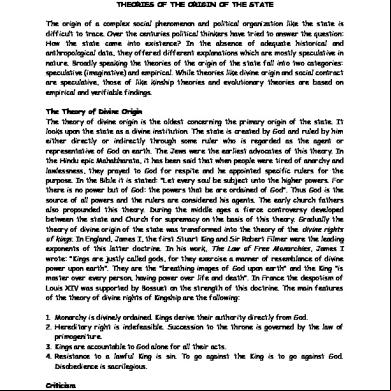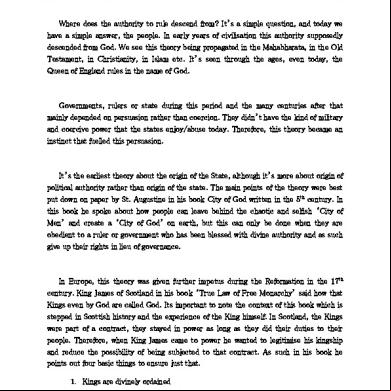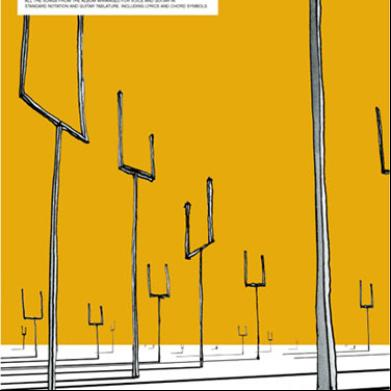Copy Of Origin Of Society 2e1x18
This document was ed by and they confirmed that they have the permission to share it. If you are author or own the copyright of this book, please report to us by using this report form. Report 445h4w
Overview 1s532p
& View Copy Of Origin Of Society as PDF for free.
More details 6h715l
- Words: 546
- Pages: 9
SOCIALISATION Meaning: Infant- Biological organism with animal needs Gradually moulded into social being Process of moulding- Socialisation DEFINITION : Ogburn- “Socialisation”- process to learn norms- To conform to norms
PHASES OF SOCIALISATION 1. Primary Socialization In infancy,childhood Three sub-stages i) Oral stage- Feeding time ii) Anal stage- Toilet training
iii) Oedinal stage- Identifies with social roles 2. Secondary Socialization
Latter stage of childhood It is continuous process
3. Anticipatory Socialisation 4. 5.
Learning future roles Watching others, how they behave Development Socialization When one grows, he changes and moulds Identifies with society, values, norms Re-Socialization Learns new ways of thinking,feeling Where one converts into another religion Re-socialisation occurs
ELEMENTS OF SOCIALISATION 1. Physical and psychological heritage of individual Inborn physical and mental capacities If defective- cannot socialise himself 2. Environment in which he lives Environment influences socialisation Good school, social equality,proper environment 3. The culture of the group Culture of his group influence Early or slow socialisation 4. Experience of the individual Experience of individual Influence socialisation process
FACTORS OF THE PROCESS OF SOCIALISATION 1. Imitation
Children imitate others Language acquired by imitation
2. Suggestion
Process of communicaing information Suggestion influences behaviour
3. Identification
Through identification,he becomes sociable
4. Language
By language- one learns folkways,mores
DIFFERENCES BETWEEN SOCIALISATION,SOCIALITY,SOCIALISM socialisation- inducing individual into social world Sociality- a quality Socialism- a theory-mass of production controlled by state NEED OR IMPORTANCE OR VALUE OF SOCIALISATION Individual learns folkways ,mores Self of individual develops It teaches culture CHIEF AGENCIES OF SOCIALISATION 1. FAMILY
Child initiated Learns toilet training Learns language Teaches norms,regulation
2. THE SCHOOL
For socialising children To obey rules, regulations
THE PEER GROUP OR FRIENDS,PLAYGROUP OR NEIGHBOURHOOD Play mates,friends-same social position 1. Religion (The church)
To mould beliefs,ways of life To learn religions practises
2. The state
It makes laws for people Lays down modes of conduct Punishments for violation of laws
3. Mass media
Radio,t.v.,influence entire society
THEORIES OF SOCIALISATION Development of self-soul of socialsation What he precieves himself
1.
Theories of socialsation
Development of self –soul of socialisation What he percieves himself
2. cooley’s theory(theory of looking glass self)
Our perception of how we look to others How others evaluate our behaviour
3. Theory of durkheim( collective representation theory)
Beliefs,ideas,feelings,concepts shared by all Durkheim called it collective conciousness Socialisation influenced by collective representation
4. Head’s theory(self-conciousness theory)
Me formed by socialisation Me- internalised socialisation I- unsocialised side of self Development of self-both “I” and me Role taking process
FRAUD Id,ego,super ego ID- institutional, unsocialised
EGO It acts with reason It discovers what is right, what is wrong Action of individual guided by ego
SUPER EGO
It represents ideals,norms Moral aspect of personality It controls both id and ego When conflict between the two it s ego Id- biological Ego- psychological Super ego- social factors If id is strong Ego weak One becomes delinquent
PHASES OF SOCIALISATION 1. Primary Socialization In infancy,childhood Three sub-stages i) Oral stage- Feeding time ii) Anal stage- Toilet training
iii) Oedinal stage- Identifies with social roles 2. Secondary Socialization
Latter stage of childhood It is continuous process
3. Anticipatory Socialisation 4. 5.
Learning future roles Watching others, how they behave Development Socialization When one grows, he changes and moulds Identifies with society, values, norms Re-Socialization Learns new ways of thinking,feeling Where one converts into another religion Re-socialisation occurs
ELEMENTS OF SOCIALISATION 1. Physical and psychological heritage of individual Inborn physical and mental capacities If defective- cannot socialise himself 2. Environment in which he lives Environment influences socialisation Good school, social equality,proper environment 3. The culture of the group Culture of his group influence Early or slow socialisation 4. Experience of the individual Experience of individual Influence socialisation process
FACTORS OF THE PROCESS OF SOCIALISATION 1. Imitation
Children imitate others Language acquired by imitation
2. Suggestion
Process of communicaing information Suggestion influences behaviour
3. Identification
Through identification,he becomes sociable
4. Language
By language- one learns folkways,mores
DIFFERENCES BETWEEN SOCIALISATION,SOCIALITY,SOCIALISM socialisation- inducing individual into social world Sociality- a quality Socialism- a theory-mass of production controlled by state NEED OR IMPORTANCE OR VALUE OF SOCIALISATION Individual learns folkways ,mores Self of individual develops It teaches culture CHIEF AGENCIES OF SOCIALISATION 1. FAMILY
Child initiated Learns toilet training Learns language Teaches norms,regulation
2. THE SCHOOL
For socialising children To obey rules, regulations
THE PEER GROUP OR FRIENDS,PLAYGROUP OR NEIGHBOURHOOD Play mates,friends-same social position 1. Religion (The church)
To mould beliefs,ways of life To learn religions practises
2. The state
It makes laws for people Lays down modes of conduct Punishments for violation of laws
3. Mass media
Radio,t.v.,influence entire society
THEORIES OF SOCIALISATION Development of self-soul of socialsation What he precieves himself
1.
Theories of socialsation
Development of self –soul of socialisation What he percieves himself
2. cooley’s theory(theory of looking glass self)
Our perception of how we look to others How others evaluate our behaviour
3. Theory of durkheim( collective representation theory)
Beliefs,ideas,feelings,concepts shared by all Durkheim called it collective conciousness Socialisation influenced by collective representation
4. Head’s theory(self-conciousness theory)
Me formed by socialisation Me- internalised socialisation I- unsocialised side of self Development of self-both “I” and me Role taking process
FRAUD Id,ego,super ego ID- institutional, unsocialised
EGO It acts with reason It discovers what is right, what is wrong Action of individual guided by ego
SUPER EGO
It represents ideals,norms Moral aspect of personality It controls both id and ego When conflict between the two it s ego Id- biological Ego- psychological Super ego- social factors If id is strong Ego weak One becomes delinquent






